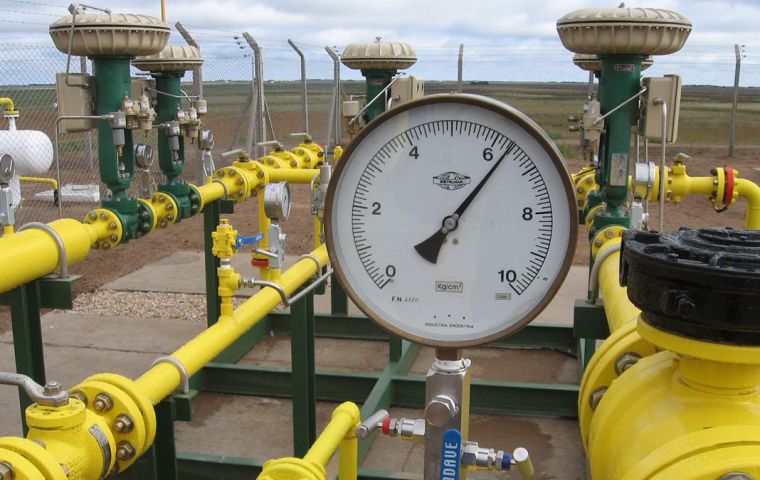MercoPress. South Atlantic News Agency
Energy exports to Brazil to finance Argentina's infrastructure works
 Brazil's demand represents an opportunity to place available surplus power, Basualdo said
Brazil's demand represents an opportunity to place available surplus power, Basualdo said Argentina's Energy Ministry has ruled that energy exports to Brazil will finance the Vaca Muerta gas pipeline and electrical transportation works, it was announced Tuesday.
According to the new administrative decision, export revenues can be allocated to works such as a new gas pipeline and the high voltage lines plan. Thus, exports of electricity to Brazil will serve as sources of financing for the infrastructure works that Argentina needs to take full advantage of its potential in gas production and electricity generation.
The new funding will also provide for the construction of the gas pipeline to Vaca Muerta (worth about US $ 1.8 billion) and the Federal Plan for Electric Transportation Works, (worth roughly another US $ 3 billion).
According to private market sources, this measure will allow the Energy Ministry to have at least US $ 100 extra million until the end of the year, which will be added to the US $ 500 million collected from the so-called “wealth tax.”
So far, export earnings have been diluted in current expenditures, mainly subsidies (the difference between the cost paid by users and the cost of producing energy). The new mechanism enables the use of those funds as capital expenditure. Large infrastructure projects have been stopped since 2018 due to the economic crisis.
Barred from borrowing at reasonable rates, Argentina has been unable to either start or complete infrastructure works needed to set the energy export business to Brazil in motion, including the new gas pipeline and the reinforcement of urban power lines with new high-voltage lines that will cross the entire country and add transport capacity so that investments in thermal, wind and solar generation are reactivated.
The Ministry of Energy's Resolution 1037 creates an Export Account within the Wholesale Electricity Market Stabilization Fund (MEM) which “allows [for] the benefits of electricity exports to Brazil to be collected in a separate account, whose specific destination is the execution of energy infrastructure works,” El Cronista reported.
These revenues will be accumulated. in said account from the economic transactions of September 2021 onwards. In the first nine months of 2021, 2,876 gigawatt-hours (GWh) were exported to Brazil, surpassing the annual record of 2,618 GWh, which had been recorded in 2020.
The average export price last year was US $ 205 per megawatt-hour (US $ / MWh); while in September this year it climbed to US $ 287.10.
Only in September 2021, Argentina exported electricity to Brazil for US $ 258 million. Projections for all of 2021 are around US $ 1 billion.
Undersecretary of Electric Energy Federico Basualdo commented: said that “Brazil's high energy requirement -associated with the extraordinary drought it faces- represents an opportunity to place available surplus power from the local system, through international interconnection, via the Garabí's converter.”
“The decision to create a specific account is aimed at guaranteeing the completion of the infrastructure works that the system needs to expand,” he added.
By burning diesel -which is imported to meet internal and external energy demand- thermoelectric machines deteriorate faster than if those running on natural gas, which renders them more expensive in terms of maintenance.
Meanwhile, YPF CEO Pablo González promised “the construction of the Néstor Kirchner gas pipeline to Vaca Muerta will be announced” shortly. González referred to the stage between Tratayén and Salliqueló, which will be financed by the “wealth tax.”
“In a few days a project will be announced, which is the construction of a gas pipeline that runs from Vaca Muerta to Salliqueló and from Salliqueló to San Jerónimo with the possibility of exporting gas to Brazil,” González said in a television interview.
The construction of a new gas pipeline that allows carrying more gas from Vaca Muerta to the rest of the country is a necessity that was classified as “the most urgent in the country.”
González stressed that “we have the second unconventional gas reserve in the world and the fourth for oil - about the resource -. What we lack is transportation capacity.”
In the meantime and also as a source of income, Argentina will import liquefied gas and resell it to a Brazilian thermal power plant at a price 10 times higher than the one charged nationwide for household use.
The Argentine firm IEASA has closed an export contract with the Brazilian thermoelectric plant Ambar Uruguaiana Energía for almost 57 million cubic meters at US $ 43.80 per million BTU, which will mean a final cost of the operation of US $ 92 million, according to the Energy Ministry.
The difference between the import cost and the sale price to Brazil will remain with IEASA. After export taxes, analysts believe it will be around US $ 7 million.
Brazil relies 60% on hydroelectric generation for energy. But for two years it has been going through a drought, which has worsened due to the historical downspout of the Paraná River and has been forced to seek other sources, such as imports of liquefied gas in Rio de Janeiro or electricity from Argentina.
The Ambar Uruguaiana plant is in the state of Rio Grande do Sul and was bought a few months ago by the J&F group from the Argentine company Saesa. It has a deliver or pay contract with the administrator of the Brazilian electricity system, so even under this gas price, it will be convenient for them to generate energy rather than pay without joining the supply system.




Top Comments
Disclaimer & comment rulesCommenting for this story is now closed.
If you have a Facebook account, become a fan and comment on our Facebook Page!